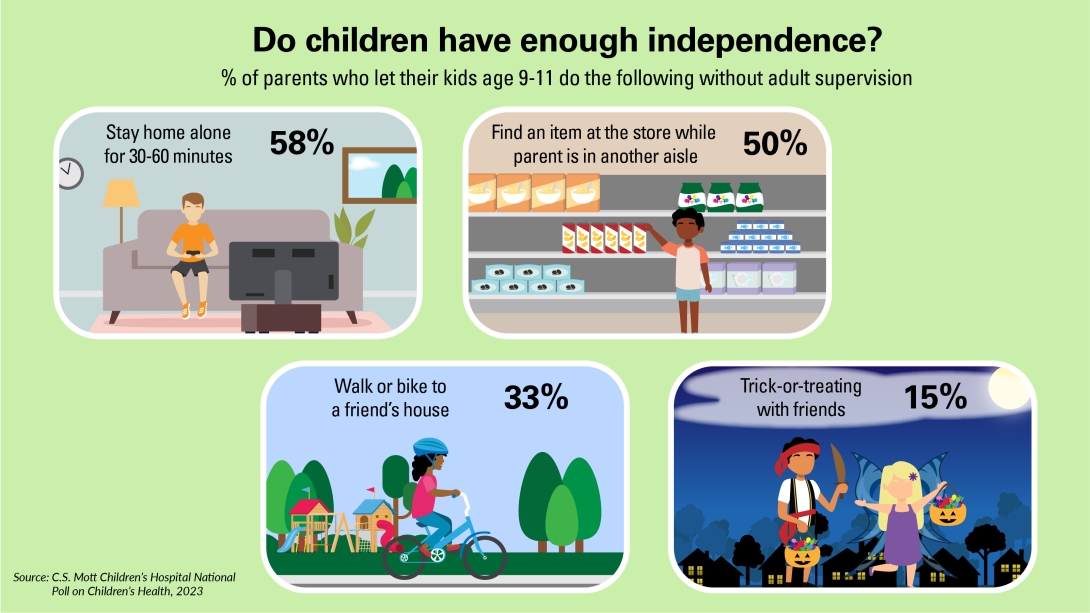6 tips for raising independent kids
5:00 AM
Author |

As they grow, children start doing certain activities without their parents watching over them, including trick-or-treating with friends, staying home alone or biking to a friend’s house.
And while most parents agree that kids benefit from opportunities to be independent, they may be engaging in more “helicopter parenting” than they realize, suggests a University of Michigan Health C.S. Mott Children’s Hospital National Poll on Children’s Health report.
“There’s a sizable gap between parent attitudes about promoting children’s independence and what they actually allow or encourage their children to do without supervision,” said Mott Poll co-director Sarah Clark, M.P.H.
“This suggests some parents may be missing opportunities to guide their children in tasks of autonomy and unintentionally hindering kids’ development of independence and problem-solving skills.”
Four in five parents of children ages 9-11 agree that it’s good for children to have free time without adult supervision.
But fewer report their child actually does certain things without an adult present, the poll suggests, including walking or biking to a friend’s house or playing at the park with a friend.
Less than a sixth of parents have let their child trick-or-treat with friends.
The poll report also suggests a disconnect between what parents of younger children ages 5-8 say and what they do in fostering independence.
Nearly three quarters say they make it a point to have their child do things themselves. But less than half of these parents say their child regularly engages in actions such as talking with the doctor or nurse at health visits, deciding how to spend allowance or gift money, speaking to unfamiliar adults in business situations, such as ordering at a restaurant, or preparing their own meal or snack.
Among reasons for keeping kids from doing these tasks were worry, getting stuck in habits, not thinking a child was mature enough or wanted to do things alone or that some tasks would take too long, according to the nationally representative poll based on responses from 1,044 parents of children 5-11 years.
Some parents may also be affected by “blame culture,” Clark said, with a little more than one in 10 parents believing others will think they are a bad parent if their child is seen without an adult.
Over half of parents say that unsupervised children cause trouble while a quarter have criticized another parent, and 13% have been criticized themselves.
But the elementary school years, Clark notes, is an important phase for developing independence with parental guidance.
“Becoming independent is a gradual process of allowing children increasing amounts of freedom, with parents there to teach skills and help the child understand the consequences of their choices,” Clark said.
“As children become more experienced and comfortable with tasks, they can assume responsibility for doing them regularly. Research shows encouraging independence fosters a child’s self-confidence, resilience, problem-solving ability, and mental health.”
Clark recommends these steps to help both you and your children gain confidence while transitioning into the teen years.
6 tips for raising independent children
1. Reduce worry by taking extra safety steps
The most common reason behind parents’ hesitancy to promote some independent milestones was safety.
Yet, while a little more than half worried someone might scare or follow their child, just 17% of parents say their neighborhood isn’t safe for children to be alone.
“To some extent, worrying about your child is natural. But some parents are limiting their child’s independent activities due to highly publicized media reports, even if those outcomes are very unlikely to occur or cannot be prevented,” Clark said.
“Parents can ease in with small steps such as letting their child spend time with a friend at a familiar public place. Discussions before and after can help parents assess if their kids understand the importance of following safety rules.”
Parents may also put in some guardrails to decrease their anxiety as their child engages in more tasks alone, Clark says.
If children are meeting friends at the library, mall or park, parents may check in with staff or with other parents to feel comfortable that the location is appropriate.
Some parents may also give their child a cell phone to stay in touch but should limit cell phone use to brief check-ins, unexpected changes in plans, or true emergencies, as constant calls and texts will not help the child become more independent.
2. Explore age appropriate tasks
Parents can be more purposeful about fostering independence by considering if there is a good reason not to let the child do a particular task, Clark says.
For younger children, this might be simple things like picking up their toys, getting dressed by themselves, pouring a drink or clearing dishes.

As they get older, they can take on bigger responsibilities like packing their own lunches, meal planning and preparation (i.e. chopping vegetables), learning to do laundry and managing a small allowance for personal expenses.
3. Be patient
Since allowing a child to do things independently often requires extra time and patience, parents might avoid the early morning rush and instead choose a time and place that allows ample time for the child to practice a new skill while parents offer guidance and, when appropriate, safety tips.
Some parents may be missing opportunities to guide their children in tasks of autonomy and unintentionally hindering kids’ development of independence and problem-solving skills.”
- Sarah Clark, M.P.H.
Also accept that certain things may not be done perfectly – kids may make more of a mess when preparing their own snacks or meals or even in an attempt to clean, for example.
“It's important to remember that every child develops at their own pace and
making mistakes is part of the learning process,” Clark said.
“Parents should provide appropriate support but avoid taking over tasks for them if they struggle.”
4. Encourage kids to engage in conversation with adults
Learning to interact with adults outside the family is essential, Clark says.
In an emergency, for example, children should be able to seek assistance from a responsible adult.
Parents can help their child learn to identify trusted adult (e.g., a staff member) and practice making a request, such as asking for assistance, or ordering lunch.
These small steps can be particularly important for children who are shy.
Having children talk to health professionals, such as by answering questions directly and expressing health concerns or questions, will also better prepare them to eventually take ownership of their own health.
“Over time, parents can gradually step back as the child gains experience and comfort in talking to adults and speaking up, which is an important lifelong skill,” Clark said.
5. Avoid helicopter parenting
Children who are constantly monitored, micro-managed and critiqued by “helicopter parents” may feel incapable of making decisions or handling situations on their own, Clark says.
Some experts also suggest that increased rates of anxiety in children may be related to having inadequate opportunities to develop their independence, she adds.
“While parents often have good intentions, this helicopter approach can have negative consequences by impeding the child from gaining the experience and confidence they need to become a healthy and well-functioning adult,” she said.
“Letting go is important. Parents can still provide their children guidance and support while allowing them space to learn from their own experiences and make mistakes.”
6. Emphasize learning experiences
Debriefing is a good way for parents to assess their child’s confidence in trying new independent activities and identify areas where the child has questions or needs additional guidance.
“By pointing out what their child did successfully, parents help their child feel a sense of accomplishment, which sets the stage for the next step toward independence,” Clark said.

Explore a variety of health care news & stories by visiting the Health Lab home page for more articles.

Department of Communication at Michigan Medicine
Want top health & research news weekly? Sign up for Health Lab’s newsletters today!





